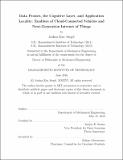Data proxies, the cognitive layer, and application locality : enablers of cloud-connected vehicles and next-generation internet of things
Author(s)
Siegel, Joshua Eric
DownloadFull printable version (29.55Mb)
Alternative title
Enablers of cloud-connected vehicles and next-generation internet of things
Other Contributors
Massachusetts Institute of Technology. Department of Mechanical Engineering.
Advisor
Sanjay E. Sarma.
Terms of use
Metadata
Show full item recordAbstract
Intelligent and Connected Vehicles reduce cost, improve safety, and enhance comfort relative to isolated vehicles. This ability for cars to sense, infer, and act facilitates data-driven improvements in occupant experience and vehicle design. This thesis explores informed individual vehicle improvements and proposes a secure and efficient architecture supporting connected vehicle applications. Applying On-Board Diagnostic and smartphone data, I built a suite of prognostic applications. Engine coolant temperature data supports inference of oil viscosity and remaining life. A linear SVM using Fourier, Wavelet, and Mel Cepstrum audio features provides 99% accurate engine misfire detection. PCA-transformed Fourier acceleration features and GPS data inform decision trees attaining 91% wheel imbalance and 80% tire pressure and tread depth classification accuracy. These applications demonstrate the ability for local vehicle and peripheral device data to proactively improve individual vehicle reliability and performance. Connectivity facilitates crowdsourced data to further improve current vehicles and future designs. Exploring vehicular connectivity, I consider data timeliness, availability and bandwidth cost in the context of an efficiency-improving idle time predictor. This predictor uses contextual information to eliminate short idle shutoffs in Automatic Engine Start/Stop systems, minimizing driver annoyance and improving compliance. These applications reveal an opportunity to address excess resource consumption and system insecurity in Connected Vehicles and other constrained devices. I introduce a secure and efficient model-based Internet of Things (IoT) architecture consisting of a "Data Proxy" utilizing a Cloud-run estimator to mirror an object with limited sensor input. The use of digital duplicates abstracts physical from digital objects, allowing the use of a mediating "Cognitive Layer" consisting of firewall and supervisory elements. These "Cognitive" elements apply the system model to monitor system evolution and simulate the impact of commands against known and learned limits. Finally, I propose incorporating this architecture into the CloudThink digital object duplication platform. Proxies maximize data collected per unit cost, while the firewall and supervisory elements will allow increased actuator access and to support generalized Cloud-based prognostics. I discuss how CloudThink's data ownership policies and privacy visualization tools combine with this architecture to address consumer privacy and security concerns, improving consumer acceptance of Connected Vehicles.
Description
Thesis: Ph. D., Massachusetts Institute of Technology, Department of Mechanical Engineering, 2016. This electronic version was submitted by the student author. The certified thesis is available in the Institute Archives and Special Collections. Cataloged from student-submitted PDF version of thesis. Includes bibliographical references (pages 247-270).
Date issued
2016Department
Massachusetts Institute of Technology. Department of Mechanical EngineeringPublisher
Massachusetts Institute of Technology
Keywords
Mechanical Engineering.